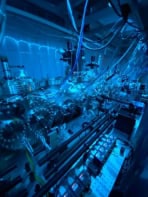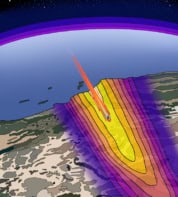
Two of Canada’s best known physics facilities are expanding thanks in part to separate grants from the Canada Foundation for Innovation (CFI). The Sudbury Neutrino Observatory Laboratory (SNOLAB) in Ontario has bagged C$10.6m, to be spent on the ongoing expansion of its underground facilities. Meanwhile, the Perimeter Institute for Theoretical Physics in Waterloo, Ontario has received C$10.0m to double the size of its facility.
DEAP SNO in Sudbury
Located in a former nickel mine more than 2 km underground, SNOLAB is undergoing a facelift, with two new underground chambers completed earlier this year. Securing the CFI money will allow the lab to start building two new experiments — DEAP-3600 and SNO+ — which could be up and running in about two years.
SNO+ will study the properties of neutrinos as well as search for neutrinos from supernovas. It is a major refurbishment of the original SNO experiment, which stopped taking data in 2006. Switched on a decade ago, SNO was source of a major physics breakthrough in 2001, when data from its underground detectors confirmed that neutrinos have mass.
DEAP-3600, meanwhile, will use a 3.6 tonne liquid-argon detector to search for weakly interacting massive particles, or WIMPS. These hypothetical particles interact only via the weak nuclear force and gravity, and are a prominent candidate for dark matter.
Expanding the Perimeter
The Perimeter Institute was founded in 1999 by Mike Lazaridis, chief executive of Research in Motion — the company that makes Blackberry wireless handheld devices. Home to more than 60 resident researchers, the Institute focuses on areas such as cosmology, particle physics, quantum gravity and quantum computing. Residents include quantum gravity specialist Lee Smolin and cosmologist Neil Turok — who is also director.
Built in 2002, the institute’s existing building has won several architectural awards and is now fully occupied. As well as boosting individual and group research spaces, the new CFI cash will also be spent on new teaching facilities — the institute will join forces with the University of Waterloo and take on 25 students in August when its Perimeter Scholars International MSc programme begins.
Plans for the expansion have been drawn up and the institute’s communications coordinator Angela Robinson told physicsworld.com, “The groundbreaking is expected soon, with construction taking about two years”.




